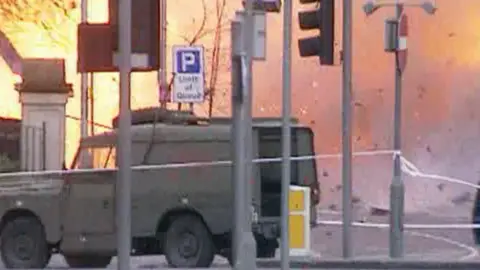Jon Boutcher voices "extreme caution" over legacy idea
 PAcemaker
PAcemakerAn ex-police chief in charge of several investigations related to the Northern Ireland Troubles has voiced concern about aspects of the government's new plan to deal with legacy issues.
Under its proposal, most investigations would be closed and prevented in legislation from ever being re-opened.
But Jon Boutcher, the head of Operation Kenova, said the idea "should be approached with extreme caution".
He also questioned whether the plan complies with the law.
In a significant move away from what was set out in the 2014 Stormont House Agreement, the government came up with fresh ideas on dealing with the past three months ago.
While it is proposed around 2,000 cases would be "swiftly" reviewed, there would only be full-blown investigations for those where there is "new compelling evidence and a realistic prospect of a prosecution".
Mr Boutcher, the former chief constable of Bedfordshire, is heading independent investigations into several killings, including those linked to the top Army agent within the IRA, code-named Stakeknife.
His response to the government's plan was made in a submission to the Northern Ireland Affairs Select Committee at Westminster.
He said he supports a speedy resolution of Troubles cases, but there must be "no compromise" in the quality of reviews or investigations.
"The proposal to close down investigations of murder in legacy cases after a quick review process where those cases could not be re-opened would, I believe, be a legal novelty in the United Kingdom for serious crimes such as murder," he added.
"This proposal should be approached with extreme caution.
"An investigation/review which starts and finishes only with the information available at the outset and does not allow for the development of lines of enquiry would not be Article 2 ECHR (European Convention on Human Rights) compliant."

Mr Boutcher said he accepted prosecutions would be "very much the exception".
However, he concluded families want investigations that are "robust in the search for the truth".
The government has promised further talks on its proposals, but they are strongly opposed by Sinn Féin and the SDLP.
The Irish government has also stated it stands by the legacy approach set out in the Stormont House Agreement.
